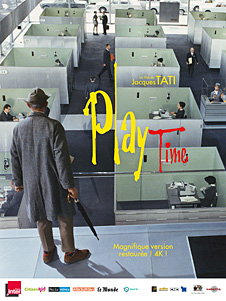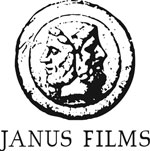PLAYTIME
Special Presentation (restored version) • Comedy • France, 1967
DCP • 1.85 • Stereo • Color • 125 min
Directed by: Jacques Tati
Written by: Jacques Tati, Jacques Lagrange, Art Buchwald
Cinematography: Jean Badal, Andréas Winding
Film Editing: Gérard Pollicand
Produced by: Bernard Maurice, René Silvera (Les Films de Mon Oncle)
Cast: Jacques Tati (M. Hulot), Barbara Dennek (Barbara), Jacqueline Lecome (Barbara’s friend), John Abbey (M. Lacs), Valérie Camille (M. Lacs’s assistant), Billy Kearns (M. Schultz)
International Sales: StudioCanal
US Distributor: Janus Films, Criterion
On the occasion of the film’s 50th anniversary, COLCOA is pleased to present Playtime, Jacques Tati’s most inventive and ambitious film. Completed in 1967 after nearly three years in production, this was Tati’s droll response to Charles De Gaulle’s push to remake Paris into a modern city. The sparse plot unfolds in a series of six set pieces over a 24-hour period. American tourist Barbara and a certain bemused local, Monsieur Hulot, have several chance encounters. Barbara tries to discover authentic France in an homogenized city whose iconic monuments have been replaced by photographic simulations. Meanwhile, Hulot blunders through a sterile world of glass and steel, a traditionalist bull in the china shop of modernity. Daring in scope and concept, the film establishes a society regimented by soulless conformity, and then proceeds to break that down through a series of silly mishaps. For Tati, the sublime optimist, these moments of comic chaos and whimsy were the humanizing elements that make joyless dystopian futures bearable.
In 1958, writer/director Jacques Tati was riding a wave of success. His new film Mon Oncle won the Jury Prize at Cannes as well as an Oscar for Best Foreign Language Film. The raincoat and long-stemmed pipe of his bungling alter ego Monsieur Hulot had become as iconic as the Tramp’s baggy trousers and bowler hat. But Hulot was a hindrance to Tati’s greater ambitions. He had a vision for a style of film that emphasized situation over character. He considered close-ups crude. He wanted to let the audience decide what was most deserving of their attention. His next picture was to be the fulfillment of those ambitions. The most expensive French film of its era, Playtime was nearly a decade in the making. Tati constructed entire city blocks of his modernist Paris from scratch, overseeing the tiniest of details. Every frame of the finished film bursts with visual pun so much so that some claim it requires several viewings to truly appreciate. A committed artist, Tati bet everything on his new venture. When the film proved a commercial failure, Tati was financially ruined. For a time, the film was infamous for having sunk Tati’s career. Today, it is celebrated as the most fully realized work of a remarkable visionary.












